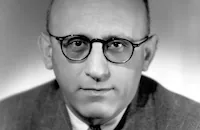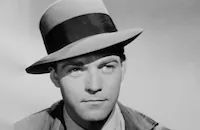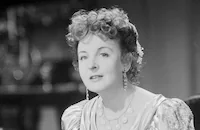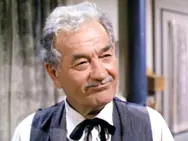Phantom Lady

Brief Synopsis
Cast & Crew
Robert Siodmak
Franchot Tone
Ella Raines
Alan Curtis
Aurora
Thomas Gomez
Film Details
Technical Specs

Synopsis
At Anselmo's bar in New York, Scott Henderson sits dejectedly next to an equally despondent woman wearing a distinctive hat. Scott offers the woman tickets to a musical show that he cannot use, but she is not interested until Scott asks if she would like to accompany him to the show. Impulsively she agrees, on the condition that they do not exchange any personal information and just enjoy the evening together. At the show, Scott and the woman sit near the front, where the woman attracts the eye of the orchestra drummer and singer Estela Monteiro, who is furious that the woman's hat matches her own. After the show, Scott escorts the woman back to the bar and they part amicably. Upon returning to his apartment, Scott is greeted by by police Inspector Burgess, who informs him that Scott's wife Marcela has been strangled to death with one of Scott's ties. Shocked, Scott describes the evening, which began when Scott quarreled with his wife because she refused to go out with him to celebrate their anniversary. When he mentions the woman with the unique hat, the police grow skeptical, and Scott is taken to headquarters for further questioning. The next day at Scott's office, his secretary, Carol Richman, reads about Marcela's murder in the newspaper and struggles to get through the regular business of the day. Meanwhile, Scott retraces his actions of the night before with Burgess, going to Anselmo's, where the bartender vaguely recognizes Scott, but cannot recall the woman in the hat. Scott and Burgess also question the cab driver who drove them to the show, the orchestra drummer and the singer, Estela, but no one claims to remember the woman. Scott is arrested and during his trial his repeated assertions about the mysterious woman are not believed and he is found guilty of murdering Marcela. Stunned, Carol visits Scott in jail and the two speculate about why the publicity of the trial did not bring the mystery woman forth. Confident Scott has told the truth, Carol goes to Anselmo's bar, hoping to provoke the bartender into changing his testimony. After three evenings at the bar, Carol follows the bartender and confronts him outside a subway station. Under pressure, he admits he received money not to talk, but before he can be more specific, he panics and darts away, only to be hit by a car and seriously injured. Feeling guilty and distraught, Carol returns to her apartment and finds Burgess, who tells her that he believes Scott is innocent and wants to unofficially help her locate the phantom woman. The next night Carol attends the music hall show, dressed in gaudy and suggestive attire, which attracts the attention of the orchestra drummer, Cliff. After the show Carol, calling herself Jeannie, meets Cliff backstage and goes with him to a small club, where he briefly sits in on a jazz jam session before taking her to his apartment. Carol steers the conversation around to money, and Cliff boasts that he recently received five hundred dollars from a man for not identifying a particular "dame." When Carol, struggling against Cliff's amorous advances, tries to get more information, her purse is knocked over and police papers on the drummer which Burgess had provided her spill out. Alarmed, Cliff scuffles with Carol, who breaks away and runs down to the street, where she telephones Burgess from a nearby shop. Unknown to Carol, a man has gone into Cliff's apartment and after threatening him, strangles him. Later, when Burgess arrives with a warrant, he and Carol find Cliff dead. Shortly afterward, Carol visits Scott in jail again and discovers his appeal has been denied. As they sit considering their options, Cliff's killer, Jack Marlow, who is Scott's best friend, arrives. Claiming to have come back from South America when he heard about Scott's misfortune, Jack offers to help and Scott and Carol gratefully accept. Jack accompanies Carol and Burgess to see Estela and, unknown to them, arranges to have the singer leave town the next day. Burgess later tells Jack he believes the killer is paranoid and insane, which irritates Jack, then brings on a dizzy spell and collapse. While Burgess is called out of town working another case, Carol tries in vain to see Estela, but instead discovers the singer's luggage being removed from her hotel. Carol notices a hat box and, taking down the milliner's address, goes to the hat shop, where an assistant designer confesses to copying Estela's hat for a wealthy Long Island client, Ann Terry. Carol enthusiastically tells Jack about Ann, and he drives her out to Long Island. There Carol discovers that Ann suffered a nervous breakdown after her fiancé's accidental death. Carol falters when she realizes Ann is too emotionally fragile to question, and leaves without asking about her evening with Scott. On the drive back, Carol asks to phone Burgess and Jack pretends to make an arrangement for them all to meet later at his apartment. At Jack's place, Carol frets about her inability to help Scott and is bitter about the murderer. Jack develops a headache and lies down while Carol goes to freshen up. In Jack's bedroom, she discovers the handbag she left behind at Cliff's and realizes with horror that Jack is the murderer. She tries phoning Burgess, but is interrupted by Jack. In the living room Jack reveals that he and Marcela had been involved and she had callously refused to run away with him, forcing him to kill her and frame Scott. Jack is about to attack Carol, when the doorbell rings, and she screams for help. Burgess breaks the door in and Carol runs to him, while Jack throws himself out the window to his death. After Scott is released from jail, he and Carol plan their future together.

Director

Robert Siodmak
Cast

Franchot Tone

Ella Raines

Alan Curtis
Aurora

Thomas Gomez

Fay Helm

Elisha Cook Jr.
Andrew Tombes

Regis Toomey

Joseph Crehan

Doris Lloyd
Virginia Brissac

Milburn Stone
Freddie Slack
Barney Bigard
Roger Hanson
Bob Bain
Howard Ramsey
Dole Nicholls
Dave Coleman
Crew
Woody Bredell
Bernard B. Brown
Eddie Cherkose
Robert Clatworthy
R. A. Gausman
John B. Goodman
Joan Harrison
Arthur Hilton
Kenneth Hopkin
Lester Horton
Joe Lapis
Jacques Press
H. J. Salter
Bernard C. Schoenfeld
L. R. Smith
Seward Webb
Vera West

Photo Collections
Videos
Movie Clip





Hosted Intro
Film Details
Technical Specs

Articles
Phantom Lady
In Phantom Lady, Alan Curtis plays Scott Henderson, a man who, as the film opens, has just had a huge argument with his wife. When he heads out to a bar to drown his sorrows, he meets a mysterious woman played by Fay Helm. The two agree not to tell reveal their names, and spend the rest of the evening together. At one point, they attend a floor show where the singer (Aurora Miranda, Carmen's sister) is wearing a rather improbable hat that exactly matches the one Helm is wearing. (Apparently, both Miranda sisters were into ridiculous headwear.)
When he returns to his home, Henderson discovers that his wife has been strangled with his own necktie. Unfortunately, he can't give the police an alibi, because he doesn't know the name of the woman who was with him at the club. Eventually, he's tried, convicted, and sentenced to death. The only person who believes him is his longtime secretary, Carol "Kansas" Richman (Ella Raines.) "Kansas" then goes to great lengths - including, at one point, pretending to be a prostitute - to track down the "phantom lady" and free her boss. This all leads to some nastiness involving frame-up money and Franchot Tone. You probably won't believe a single minute of it, but won't care because it's so well done.
Initially, Harrison seemed an unlikely candidate to end up working in movies. She was born in Surrey, England, where her father was a prominent newspaper publisher. Brainy and determined from the beginning, she attended Oxford University, then the Sorbonne. After graduation, much to her well-heeled father's dismay, she became a copywriter. She then passed through a journalism phase, and - for rather obscure reasons, given her background - started doing secretarial work. Dad must have loved that one.
Luckily, Harrison's unexpected interest in typing and filing for a living led to a job as Hitchcock's personal secretary. She was already a fan of Hitch's movies, and loved crime novels, when she hooked up with him and followed him to the U.S. Eventually, she climbed the cinematic ladder and received screenwriting credit on such films as Rebecca (1940), Suspicion (1941), and Saboteur (1942). But she was involved in many aspects of their production, a crash course that gave her all the training she needed to be a producer.
One day in Los Angeles, Harrison ran into Siodmak at a restaurant near the Universal lot. The two began talking and immediately realized that they were kindred spirits: talented, displaced Europeans who had an interest in the underbelly of life and wanted to make movies that weren't what you expected from the studio's well-oiled assembly line.
Breaking free of her mentor, Harrison soon talked Universal into letting her produce a novel that she had purchased called Phantom Lady, with Siodmak directing. This was no small accomplishment. Women seldom stood toe-to-toe with studio executives in those days, although it probably helped that Phantom Lady seemed a great deal like a Hitchcock picture. Hollywood likes nothing better than trying to duplicate past successes, and Harrison had a bona fide Hitchcock pedigree.
The resulting film was treated as a typical B-movie of the period by critics. David Lardner, of The New Yorker, wrote, "There has been a tendency in mystery movies lately to play down the detective and have the crimes solved more by accident than by deduction. If this is meant to be realism, it is of an ill-advised sort." But that's being a spoilsport. Phantom Lady was actually a profitable film and has grown in stature over the years. It's now rightfully viewed as one of the better film noirs of the period. Surely, Hitchcock must have been proud of his secretary.
Producer: Joan Harrison
Director: Robert Siodmak
Screenplay: Bernard C. Schoenfeld (based on the novel by Cornell Woolrich)
Music: H.J. Salter
Cinematography: Elwood Bredell
Editing: Arthur Hilton
Art Design: John B. Goodman and Robert Clatworthy Set Design: Russell A. Gausman and Leigh Smith Costumes: Vera West and Kenneth Hopkins Principal Cast: Franchot Tone (Jack Marlow), Ella Raines (Carol "Kansas" Richman), Alan Curtis (Scott Henderson), Aurora Miranda (Estella Monteiro), Thomas Gomez (Inspector Burgess), Fay Helm (Ann Terry), Elisha Cook, Jr. (Cliff March), Regis Toomey (Detective), Joseph Crehan (Detective).
B&W-87m. Closed captioning.
by Paul Tatara

Phantom Lady
Quotes
Trivia
Notes
Phantom Lady marked the first producing credit for Joan Harrison, formerly a screenwriter on several films for director Alfred Hitchcock. Harrison later went on to produce Hitchcock's television series, Alfred Hitchcock Presents. Contemporary sources indicate that Dave Coleman dubbed Elisha Cook's erotic drum solo. A Hollywood Reporter news item reveals that songwriters Eddie Cherkose and Jacques Press filed suit against Universal for $20,000 in July 1944 for not giving them screen credit for their song "Chick-ee-Chick," which was sung in the film by Aurora. The disposition of the suit has not been determined. On March 27, 1944, Ella Raines and Alan Curtis recreated their roles as "Carol" and "Scott," with Brian Aherne taking the role of "Jack" on a Lux Radio Theatre broadcast of Phantom Lady.

Miscellaneous Notes
Released in United States 1983
Released in United States Winter January 28, 1944
Released in United States 1983 (Shown at FILMEX: Los Angeles International Film Exposition (A "B-Movie" Marathon) April 13 - May 1, 1983.)
Released in United States Winter January 28, 1944














